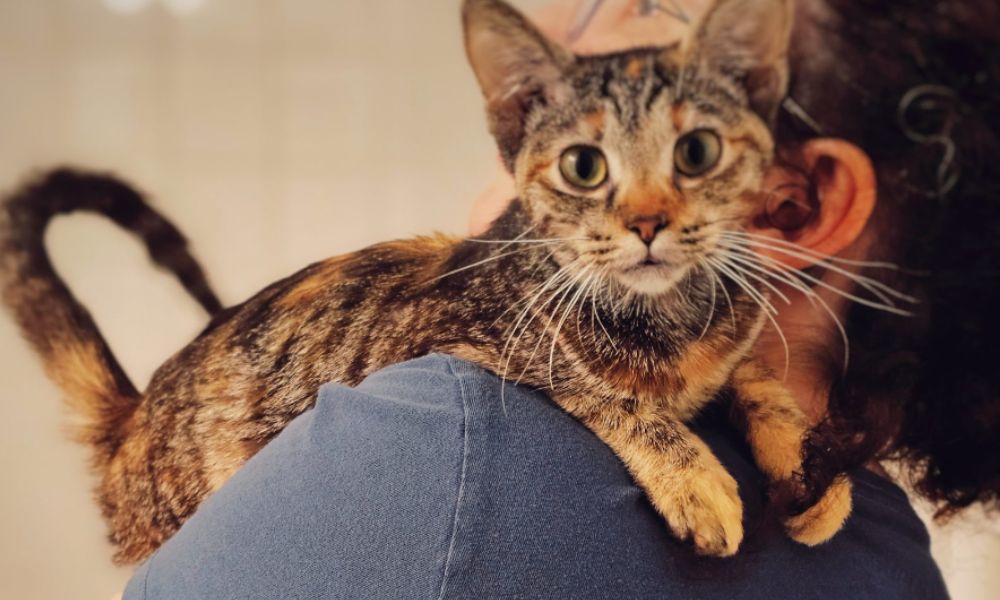Cats and kittens flown out of a wildfire-scorched Hawaii are quickly finding loving homes in Washington and Virginia thanks to a collaborative effort between the Hawaii-based The Good Cat Network (GCN) and other caring nonprofits.
GCN Executive Director Darlene Rayhill remembered looking at an evacuation alert on her phone at 4 a.m. on Aug. 8. Thankfully, the winds blew the wildfires away from Rayhill’s home. But what followed were “the saddest, most stressful, shocking, and adrenaline-filled days of my entire life,” Rayhill wrote on GCN’s website.
As of the end of August, the wildfires in Maui — the result of downed power lines and high winds during Category 4 Hurricane Dora — have killed at least 115 people and destroyed hundreds of buildings and homes. The devastation also has left an estimated more than 3,000 companion animals displaced or missing, according to the Maui Humane Society, which became the designated organization that would rescue animals from the burn zone when it was safe to do so.
Although her team wasn’t permitted into the disaster area, Rayhill knew that as soon as displaced companion animals could be rescued, they would need a place to go.
GCN, whose mission is to reduce the number of feral cats in Hawaii by getting them socialized and into forever homes, had existing partnerships with nonprofits Seattle Humane Society, the NOAH Center, and Progressive Animal Welfare Society (PAWS), all of which had welcomed adoptable cats and kittens flown into Washington state through GCN’s “Operation Aloha Cat” and which were ready to help with the increased need.
“The original idea was to free up as much foster space at our partners as possible so that they would be ready when the designated authorities (Maui Humane Society) can rescue the animals in and around the burn zone,” Rayhill told Lady Freethinker.
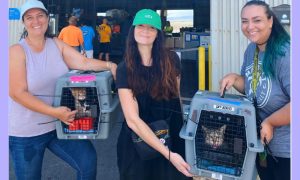
(Courtesy of The Good Cat Network)
Along with partner organization Honi Honi Cats Maui, GCN gathered donations and increased their monthly number of cat-carrying flights. Rayhill explained that none of the cats flown out were people’s displaced pets, as GCN’s intakes are stray cats rescued from cat colonies or the streets, who undergo a quarantine and foster period.
Since the fires began, as of the end of August, 87 “Good Cats” — as GCN calls its charges — have flown safely to shelter partners in Virginia and Washington, where many have quickly been adopted.
One of those sweet kittens is Malie, a brown, 10-month-old kitten with hazel eyes who was adopted by a Seattle-based family with Hawaiian ties.
The flight process — although expensive, at about $2,000 per flight — has been refined through experience and now is mainly a “well-oiled machine,” Rayhill said.
Eligible cats and kittens first go through a health certificate clinic, where they are vaccinated and assessed for flight readiness. They then travel via the airline Aloha Air Cargo in a temperature-controlled pod — not in the cargo hold.
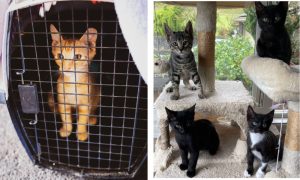
Kittens Awaiting Adoption (Courtesy of The Good Cat Network)
Rayhill explained that with its year-round cat breeding season, limited spay and neuter services, and a lack of natural predators, Hawaii has an estimated 40,000 free-roaming cats at any given time that unfortunately have been known to prey on endangered native Hawaiian birds to survive.
Prior to the disaster, GCN had been sending about 30 cats each month to Washington state — resulting in more than 540 cats now in adoptive homes who may otherwise have been destroyed had they not found their way to GCN and Honi Honi.
Hawaiian cats at Seattle Humane have a Hawaiian logo on their kennel profiles, and adopting them is a great way to help, said the nonprofit’s spokesperson Brandon Macz, adding that Hawaiian cats tend to be long, lanky, and friendly.
“As people respond to disasters and are looking for a way to help, this is a great way to do it locally,” he told news. “People really like to step up in that way, especially if they were already getting a pet. This is as good a time as any.”
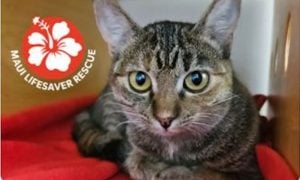
Malie, Pre-Adoption (Courtesy of The Good Cat Network)
Rayhill noted that “adopting from Hawaii helps Hawaii.”
She added, however, that people don’t have to make a special trip out to Washington when many cats in their own areas likely also need good homes.
“You don’t need to travel thousands of miles to get to Seattle just to adopt a Maui cat,” she said. “Just adopt one locally! Adopting is always a good idea if you are financially stable and can commit to a loving forever home.”
“If you can’t, please consider fostering,” she added. “Most organizations will set you up with all you need, and there is no commitment. Just giving an animal a break from the shelter environment is a huge help.”
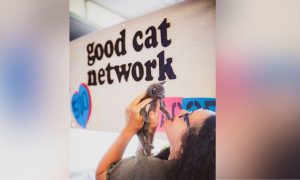
(Madelynne Lorraine Photography/ Courtesy of The Good Cat Network)
People not able to foster or adopt cats can also help by supporting, donating, or volunteering “for any organization or individual that you feel connected to,” Rayhill added.
“Everyone involved in Good Cat Network’s effort has been volunteering and contributing to several others as well,” Rayhill said. “That is beautiful, and desperately needed.”
“Despite the pain, the sobbing, and the breakdowns, I have never felt more love from those I have never met,” she added. “All of the love and support from those I do know has meant the world, too. That combined love is what has kept us going.”
To learn more about the Good Cat Network or follow their work, you can check out their website, Facebook page, or Instagram account.

